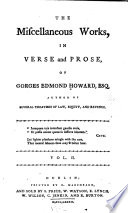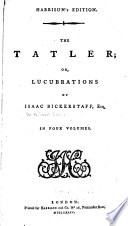 | Great Britain - 1710 - 488 pages
...above him but for his Virtue, none below him but for tiis Vice, can never be obfequious or affumirtg in a wrong Place, but will frequently emulate Men in Rank below him, and pity thofe above him. This Senfe of Mankind is fo far from a levelling Principle, that it only fets us upon... | |
 | Sir Richard Steele - 1712 - 418 pages
...of our Inferiors, it will have an ill EfFed upon our Behaviour to both. Me who thinks no Man ab*ve him but for his Virtue, none below him but for his Vice, can never be obfequious of affuming in a wrong Place, but will frequently emulate Men in Rank below him, and pity... | |
 | 1728 - 344 pages
...Subordination of our Inferiors, it will have an ill Effect upon our Behaviour to • both. He who thinks no Man above him but for his Virtue, none below him but for his Vice, can never be obfequiousoraflumingina wrong Place, but will frequently emulate Men in Rank below him, and pity tliofe... | |
 | Tatler - 1754 - 338 pages
...Subordination of our Inferiors, it will have an ill Effecl upon our Behaviour to both. He who thinks no Man above him but for his Virtue, none below him but for his Vice, can never be obfequious or afluming in a wrong 'Place, but will frequently emulate Men in Rank below him, and pity... | |
 | English essays - 1709 - 388 pages
...above him bat for hisvirtue, none below him but for his vice, can never ber obfequious or affuming in a wrong place ; but will frequently emulate men in rank below him, and pity thofe" about him. This fenfe of mankind is fo far from a levelling principle, that it only fets us... | |
 | Gorges Edmond Howard - 1782 - 376 pages
...Fortune, not ourfelves. The virtuous man is he, who knows how to fubdue his pafllons. He who thinks no man above him but for his virtue, none below him but for his vice, cannot be obfequious or afluming in a wrong place. There needs but one bad inclination to make a man... | |
 | 1785 - 698 pages
...fubordination of our inferiors, ¡twill have an ill efteil upon our behaviour to both. He who thinks no man above him but for his virtue, none below him but for his vice, can never be ob, fequious or afluming in a wrongphce; but will frequently emulate men in rank below him, and pity... | |
 | American literature - 1808 - 356 pages
...subordination of our interiors, it will have an ill effect upon our behaviour to both. He who thinks no man above him but for his virtue, none below him but for...far from a levelling principle, that it only sets us upou a true basis of distinction, and doubles the merit of such as become their condition. A man in... | |
 | Conduct of life - 1810 - 234 pages
...yourselves, but your defects tO'know, Make use of ev'ry friend and ev'ry foe. He who thinks no man above him but for his virtue, none below him but for his vice, can never be obsequious in a wrong place. That is a mean and despicable kind of pride, that measures worth by the gifts of... | |
| |